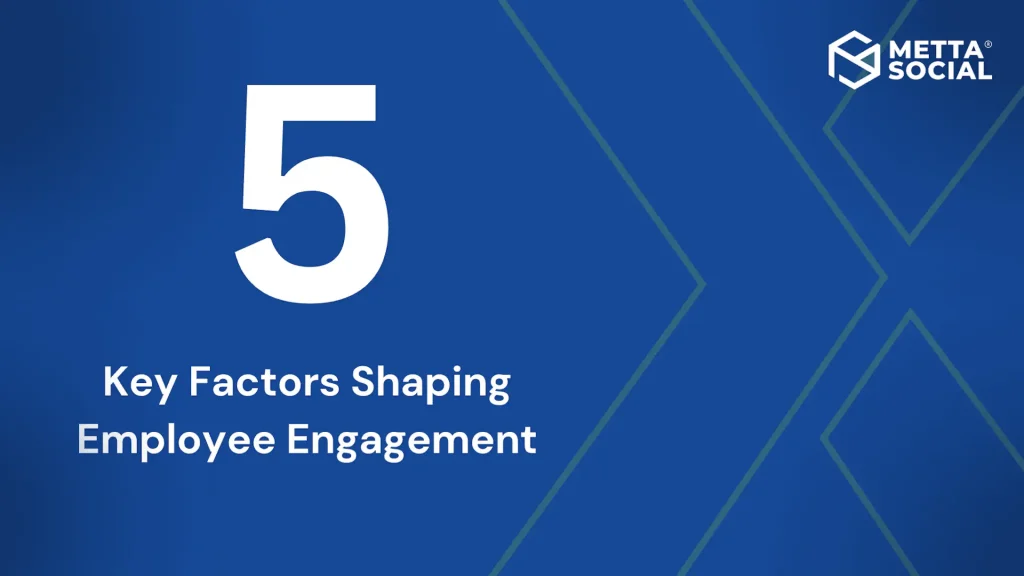Top 5 Key Factors Shaping Employee Engagement!

Employee engagement and retention is a critical concern for organisations across industries. High turnover rates can disrupt productivity, increase recruitment costs, and impact overall morale. However, research consistently shows that engaged employees are more likely to stay with their companies. In this blog post, we’ll explore the reasons behind this phenomenon and highlight some proven facts that underline the Benefits of employee engagement in promoting loyalty and commitment.
1. Sense of Purpose and Connection:
Engaged employees often have a clear understanding of how their work contributes to the organisation’s goals and mission. When employees feel connected to the company’s purpose, they are more motivated to invest their time and energy into their roles. According to a Gallup study, employees who strongly agree that they can link their goals to the organisation’s goals are 3.5 times more likely to be engaged at work.
2. Recognition and Appreciation:
Recognition plays a significant role in employee engagement and retention. Employees who feel valued and appreciated for their contributions are more likely to feel satisfied in their roles and committed to the organisation. A survey by Achievers found that 82% of employees wish they received more recognition for their work. Companies that knows how to create an effective employee recognition programs and appreciation tend to experience higher levels of employee engagement and retention.
Also we can implement a multi-faceted recognition program that includes employee engagement activities, peer-to-peer recognition, and rewards for exceptional performance. For example, consider declaring an “Employee of the Month” program or an internal recognition platform where colleagues engagement can boost by acknowledging each other’s achievements.
3. Opportunities for Growth and Development:
Engaged employees are often seeking opportunities for growth and development within their organisations. Companies that invest in employee development programs, training initiatives, and career advancement opportunities are more likely to retain top talent. Research conducted by LinkedIn revealed that 94% of employees would stay at a company longer if it invested in their career development.
4. Positive Work Environment and Culture:
The work environment and organisational culture significantly impact employee engagement and retention. Employees who feel supported, respected, and included in their workplace are more likely to stay with their companies. According to a study by Deloitte, 94% of executives and 88% of employees believe a distinct workplace culture is crucial to business success. Companies that prioritise creating a positive work culture strategies are better positioned to retain their employees. By promoting DEIB in the organizations will not only ensure employee retention and satisfaction but also contribute to overall organizational growth.
Companies that prioritise creating a positive work culture strategies are better positioned to retain their employees. By promoting DEIB in the organizations will not only ensure employee retention and satisfaction but also contribute to overall organizational growth.
5. Work-Life Balance and Well-being:
Employees value work-life balance and well-being now more than ever. Organisations that offer flexible work arrangements, wellness programs, and support for work-life balance are more likely to retain their employees. A survey by SAP found that 76% of employees want diversity in the workplace. Employers that prioritise employee well-being and flexibility demonstrate a commitment to supporting their employees’ overall happiness and satisfaction.
By prioritising factors such as purpose, recognition, opportunities for growth in the workplace, positive culture, and work-life balance, organisations can improve working environments where employees feel valued, motivated, and committed for the long term. Investing in employee engagement is not only beneficial for individual employees but also essential for the sustainable growth and success of the organisation as a whole.
Invest in your team’s success! Discover how employee engagement can transform your workplace. Reach out for a personalised consultation on boosting employee satisfaction and retention.
Contact us at communications@mettasocial.com.